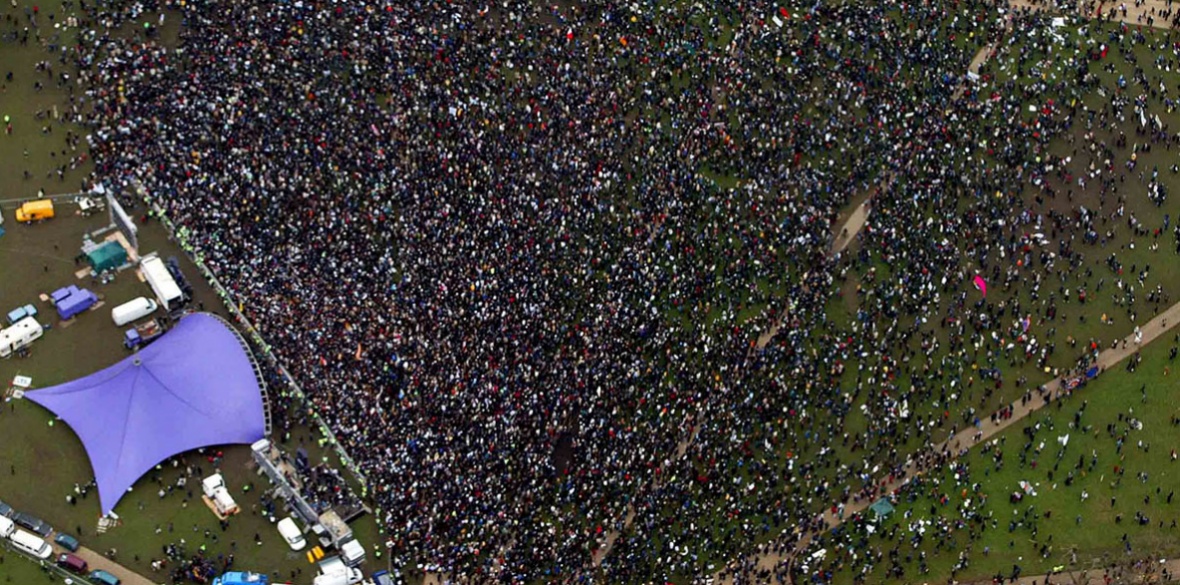This is the last article you can read this month
You can read more article this month
You can read more articles this month
Sorry your limit is up for this month
Reset on:
Please help support the Morning Star by subscribing here
IT WAS 20 years ago today, on February 15 2003, that I stepped on to the huge stage in Hyde Park.
I immediately realised this was no ordinary rally. I had never seen one million people in one place; in every direction there were people, people, people.
A sea of banners waved in the wind: our own printed ones, union ones, homemade ones and children’s heartfelt pleas for peace in the world.
People were serious yet cheerful in each other’s company; complete strangers who had never been anywhere near a demonstration before become best friends with the hardy annuals.
I have never been so acutely aware of the audience at any event before or since; the thousands of faces I could see of all ages, all communities and all parts of this country looking and listening with the hope that their presence would make a difference, and save lives.
A few hours earlier, London came to a near standstill as thousands disgorged from the railway and coach stations, and joined one of the four assembly points.
Just getting there was a struggle. I walked up to my local Tube station, Tufnell Park. Looking at the queue down the road, full of familiar faces, I assumed there was a problem at the station.
I eventually made it to central London, and joined the start of the march alongside the brilliant composer, Peter Maxwell Davies, who is sadly no longer with us.
Whenever I hear Farewell to Stromness, I think of him and our conversation about cultural values, art, music and peace — and I think about that extraordinary day.
As I was being introduced to speak, I was nervous. This was the culmination of 18 months of campaigning, bringing together Stop the War activists, the Campaign for Nuclear Disarmament, unions and many peace groups.
It had been a long, hard road to get a simple and fundamental message out, particularly in the face of voices in Parliament and in the media claiming an attack on Iraq was unavoidable and necessary.
Behind the stage were Rev Jesse Jackson, Ken Livingstone, Tony Benn and so many others. I had thought for days what I might say and wrote down some notes.
As I grew more worried that I would repeat what the others had already said, I crossed out my notes (which I couldn’t read anyway) and wrote what was on my mind at that moment instead.
I pointed out that Britain’s decision to invade Iraq would trigger a spiral of conflict, of hate, of misery, of desperation, that would fuel the wars, the terrorism, the depression and the misery of tomorrow.
I wanted a vote in Parliament, not to approve the war, but to vote on behalf of my multicultural community for peace.
This wasn’t just the biggest demonstration in British history. It was the biggest co-ordinated demonstration in the world. Indeed, when the rally finished, I needed to get to Paddington station so I could get to Heathrow airport.
I was meeting friends from New York Labour Against the War - Mike Marqusee and Colin Robinson - the next day, followed by a rally in San Francisco.
I was followed by performances from singers Joan Baez and Bonny Rait. Joan said with a lovely smile: “I like a man who can string two sentences together. I wish our president could!”
February 15 2003 changed the atmosphere, emboldened the peace movement and gave hope to millions. In a genuine democracy, our voices would have been heard.
The parliamentary vote was the following month, and the result is well known. Britain became part of the war machine that pulverised Iraq, killed thousands, cultivated space for terrorists, and brought about the wars of the following years.
The dead of Afghanistan were joined by the dead of Iraq, Libya, Syria. The refugees who fled are still fleeing.
The Iraq war was a terrible and wrong decision. Its victims were ordinary Iraqi men, women and children who laugh and cry just like all of us.
Those of us who protested were vilified, patronised and demonised. There were no weapons of mass destruction. We were deceived. And we were ignored. In 2016, when I was leader, I issued a formal apology on behalf of the Labour Party for the war in Iraq.
Today, we are witnessing Russia’s terrible war in Ukraine, on top of the horrors of Yemen and many other conflicts around the world.
The need for peace is more desperate than ever, yet arms sales are booming, and massive profits are being made from the misery and death that war brings.
A world that has been through Covid, faced with climate disaster and beset by massive inequality does not need wars, nor more armaments. It needs voices for peace. And it needs voices that stand up to the far right, who are seeking to divide our communities by demonising refugees — themselves victims of wars that we were involved in.
I’m not interested in bombs. I’m interested in peace. Every generation has a defining campaign such as Spain in the 1930s, Vietnam in the 1960s and 1970s.
For many of us, our defining campaign was February 15 2003. There is no glory to war. There is only misery, death and destruction. It’s up to all of us, then, to fight for a peaceful world.
Jeremy Corbyn is MP for Islington North. He was leader of the Labour Party from 2015-20 and is a former chair of the Stop the War Coalition.










